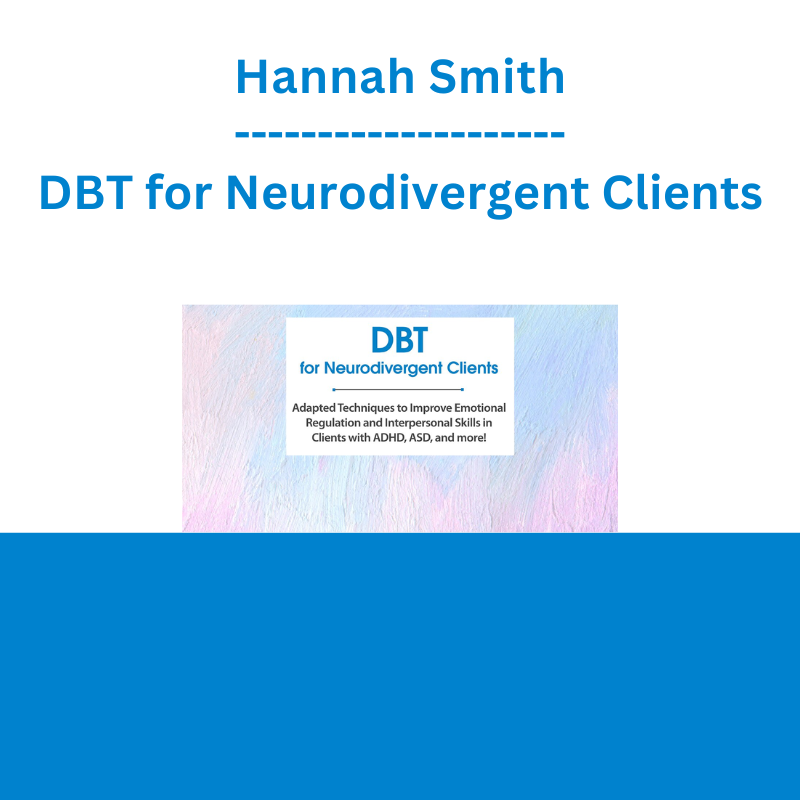*** Proof of Product ***
Exploring the Essential Features of “Hannah Smith – DBT for Neurodivergent Clients: Adapted Techniques to Improve Emotional Regulation and Interpersonal Skills in Clients with ADHD, ASD, and more!”
Speaker: Hannah Smith, MA, LMHC, CGP
Duration: 6 Hours 31 Minutes
Format: Audio and Video
Copyright: Sep 14, 2023
Media Type: Digital Seminar
Description
Dialectical Behavior Therapy (DBT) has helped thousands of therapists improve their client’s life skills quicker and more effectively than they ever thought possible…
…but if you work with clients who are neurodivergent, you could be missing key ingredients to successfully integrate DBT practices into their lives.
Whether it be talking too fast or not giving enough processing time, using analogies or idioms that don’t work, or even expressing frustrations over client manner of participating, you might unwittingly be perceived as shutting them down or trying to fix them and make them neurotypical rather than equip them to build an abundant life in their own way.
Watch neurodiverse speaker and DBT expert Hannah Smith, as she shows you highly effective ways to adapt this powerful treatment for this population and learn how to coach these skills in an accessible & inclusive way.
You’ll gain:
- Helpful tools to present DBT concepts to your neurodivergent clients and make them more accessible and useable
- Client-focused ways to target DBT skills, such as emotion regulation and interpersonal effectiveness that do not come across as “be more neurotypical”
- Increased confidence and competence in identifying and working with key aspects of neurodivergence
- …and so much more!
Clients are crying out for skills to help them manage the overwhelm but not so they can “be neurotypical” – and DBT, like no other therapy, includes whole-person/wholebrained skills that can do this.
Purchase today!
Speaker
Hannah Smith, MA, LMHC, CGP
Potential Finders
Hannah Smith, MA, LMHC, CGP, an author, business owner, and innovator, is a licensed mental health therapist and internationally board-certified group psychotherapist, consultant & clinical trainer with nearly 25 years of experience in her dual passions: helping others recover from multiple difficult life circumstances and improve their well-being and enhancing the knowledge of clinicians who work in the field of clinical care. With undergraduate degrees in hard sciences and master’s degrees in in special education and counseling psychology, she combines her knowledge in unique ways to analyze and synthesize difficult concept into “feet-to-the-pavement,” practical applications for clinical practitioners at all levels. She has done extensive study and work in neuroscience-informed treatment of anxiety and trauma and is certified in interpersonal neurobiology through the Mindsight Institute. Her work experience, both in the US and abroad, has given her a unique perspective, cross-cultural awareness, sensitivity & respect, and a relatability that puts people at ease and makes her highly approachable. Her dynamic and thought-provoking, teaching style is invigorating, making learning fun, personal, and practical.
Speaker Disclosures:
Financial: Hannah Smith maintains a private practice and receives a speaking honorarium from Cascadia Training. She receives royalties as a published author. Hannah Smith receives a speaking honorarium and recording royalties from PESI, Inc. She has no relevant financial relationships with ineligible organizations.
Non-financial: Hannah Smith is a member of the American Group Psychotherapy Association, and the Washington Mental Health Counselors Association.
Objectives
- Utilize modern-day empowering terminology and adaptive techniques to improve client engagement with neurodivergent (ND) populations.
- Identify DBT structure and the difference between individual and group approaches and their associated skills for ND populations as related to clinical practice.
- Examine typical hemispheric brain lateralization biases & vertical blocks in information processing in ND brains to enhance mindfulness practice and improve client level of functioning.
- Describe the neuroscience-informed process of naming emotions to raise awareness of places for volitional behavioral intervention in relation to assessment and treatment planning.
- Recognize vertical blocks to somatic awareness and distress tolerance skills to provide more targeted therapeutic applications and improve treatment outcomes.
- Evaluate cognitive structures (ROSE, DEAR MAN, etc.) to de-mystify interpersonal effectiveness for purposes of ND client psychoeducation.
Outline
Masking, ableism and more: a clinician’s guide to modern neurodivergence concepts
- Masking, sponging, ableism, and other key vocab/concepts
- Raising clinician competence with the wheel of neurodivergence
- Identifying/articulating key aspects of neurodivergence
- Essential therapeutic adaptations for neurodivergent populations
- In individual practice
- In group practice
Why neuroscience in DBT for the neurodiverse population – benefits & challenges
- Neuroscience-informed structure of the standard four modules
- Key features of each module
- Important difference between group and individual practice
- Liabilities, limitations & research
The problem of dialectics
- What are dialectics? What are they really?
- Contrasting neurodivergent & neurotypical brains for clarity, engagement & troubleshooting
- Modified, brain-based DBT as a solution
Awareness & adaptations in teaching mindfulness: finding the beacon in the storm
- The neuroscience of mindfulness
- The power of the present moment
- The mindful clinician & the neurodivergent brain
Regulating emotions for sensory overload – riding the mighty waves
- The macro & micro of emotions
- The process of naming & taming emotions
- Clarifying places for client-lead intervention
Neuroscience-informed strategies for distress tolerance & crisis management: from tempest to tranquility
- The rules of distress tolerance/crisis management
- Two types of distress & sensory overload
- Targeting awareness & skills
De-mystifying interpersonal effectiveness – “it’s not just social cuing”
- The 13 millisecond problem – vertical (amygdala & nervous system) blocks to interpersonal relations
- The neurodivergent brain-based need for structure, literality, logic, and more
Case studies & practical applications
Target Audience
- Social Workers
- Counselors
- Psychologists
- Psychotherapists
- Addiction Counselors
- Art Therapists
- Marriage & Family Therapists
- Psychiatric Nurses
- Psychiatrists
- Physicians
- Occupational Therapists
- Speech-Language Pathologists
- Other Mental Health Professionals
Please see the full list of alternative group-buy courses available here: https://lunacourse.com/shop/










 Alphashark - The AlphaShark SV-Scalper
Alphashark - The AlphaShark SV-Scalper